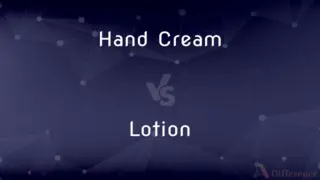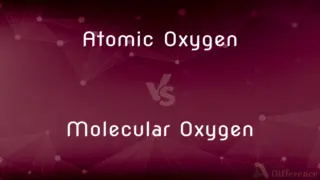Addiction vs. Habit — What's the Difference?
By Tayyaba Rehman — Updated on September 15, 2023
Addiction is a compulsive, often harmful, dependence on a substance or activity, usually accompanied by negative consequences. Habit is a regular practice or tendency that is generally easier to break and not necessarily harmful.

Difference Between Addiction and Habit
Table of Contents
ADVERTISEMENT
Key Differences
Addiction is a psychological and often physical dependence on a substance or activity, usually detrimental to one's well-being. It typically involves a compulsive need and may result in negative consequences, such as health issues or social dysfunction. Habit, on the other hand, is a learned behavior pattern that one repeats regularly, but lacks the destructive and compulsive elements commonly associated with addiction.
Addiction often involves withdrawal symptoms when the substance or activity is not available, making it difficult to quit. Medical intervention is frequently needed. Habit, conversely, does not produce withdrawal symptoms and is generally easier to break. For example, someone may easily quit a habit of taking a daily walk, but overcoming an addiction to alcohol is considerably more challenging.
In terms of psychology, addiction is considered a disease by many professionals, requiring treatment and often medication for management. Habit, however, is seen as a behavioral pattern that can be altered through willpower and conscious effort. It does not necessarily require medical treatment unless it evolves into an addiction.
Both Addiction and Habit are nouns in grammatical terms. However, their usage varies significantly. The word "addiction" often appears in medical or psychological contexts, indicating a level of seriousness. The word "habit," meanwhile, is more likely to be found in everyday language and doesn't carry the same sense of urgency or danger.
Comparison Chart
Nature
Compulsive, often harmful
Regular but not compulsive
ADVERTISEMENT
Treatment
Often requires medical intervention
Usually changed by willpower
Consequences
Frequently negative (health, social)
Not necessarily negative
Withdrawal
Likely
Unlikely
Grammatical Role
Noun, used in medical contexts
Noun, used in everyday language
Compare with Definitions
Addiction
A condition characterized by negative consequences.
His addiction led to severe health problems.
Habit
An acquired behavior pattern.
Reading before bed became a relaxing habit for him.
Addiction
A psychological and often physical dependence on a substance or activity.
His addiction to drugs ruined his career.
Habit
A tendency or disposition.
She had a habit of jumping to conclusions.
Addiction
An overwhelming desire or need.
She had an addiction to shopping that she couldn't control.
Habit
A habit (or wont as a humorous and formal term) is a routine of behavior that is repeated regularly and tends to occur subconsciously.The American Journal of Psychology (1903) defined a "habit, from the standpoint of psychology, [as] a more or less fixed way of thinking, willing, or feeling acquired through previous repetition of a mental experience." Habitual behavior often goes unnoticed in persons exhibiting it, because a person does not need to engage in self-analysis when undertaking routine tasks. Habits are sometimes compulsory.
Addiction
A compulsive need for and use of a substance.
Her addiction to caffeine was getting out of hand.
Habit
A settled or regular tendency or practice, especially one that is hard to give up
He has an annoying habit of interrupting me
We stayed together out of habit
Good eating habits
Addiction
A chronic disease of the brain reward system.
Addiction is considered a medical condition that often requires treatment.
Habit
A long, loose garment worn by a member of a religious order
Nuns in long brown habits, black veils, and sandals
Addiction
Addiction is a brain disorder characterized by compulsive engagement in rewarding stimuli despite adverse consequences. Despite the involvement of a number of psychosocial factors, a biological process—one that is induced by repeated exposure to an addictive stimulus—is the core pathology that drives the development and maintenance of an addiction, according to the "brain disease model" of addiction.
Habit
A person's health or constitution
A victim to a consumptive habit
Addiction
A condition involving use of a substance, such as a drug or alcohol, or engagement in a behavior, such as gambling, in which a person has strong cravings, is unable to stop or limit the activity, continues the activity despite harmful consequences, and experiences distress upon discontinuance
A drug used in the treatment of heroin addiction.
Habit
Be dressed or clothed
A boy habited as a serving lad
Addiction
The condition of being habitually occupied with or involved in something
Addiction to romance novels.
Habit
A recurrent, often unconscious pattern of behavior that is acquired through frequent repetition
Made a habit of going to bed early.
Addiction
The condition of using something on a regular or dependent basis
Fossil fuel addiction.
Habit
An established disposition of the mind or character
A pessimistic habit.
Addiction
An instance of one of these conditions
Had an addiction to fast cars.
Habit
Customary manner or practice
An early riser by habit.
Addiction
(medicine) A state that is characterized by compulsive drug use or compulsive engagement in rewarding behavior, despite negative consequences.
Habit
An addiction, especially to a narcotic drug.
Addiction
The state of being addicted; devotion; inclination.
Habit
Characteristic appearance, form, or manner of growth, especially of a plant or crystal
"The habit of an apple tree is fine for the small garden" (Robert Dash).
Addiction
A habit or practice that damages, jeopardizes or shortens one's life but when ceased causes trauma.
Habit
A distinctive set of clothing or style of dressing, especially of a religious order.
Addiction
A pathological relationship to mood altering experience that has life damaging consequences.
Habit
A riding habit.
Addiction
The state of being addicted; devotion; inclination.
Habit
(Archaic) Physical constitution.
Addiction
Being abnormally tolerant to and dependent on something that is psychologically or physically habit-forming (especially alcohol or narcotic drugs)
Habit
To clothe; dress.
Addiction
An abnormally strong craving
Habit
To clothe in a habit, especially a nun's habit.
Addiction
(Roman law) a formal award by a court sentence of a thing or person to another (as of a debtor to his creditor); a surrender to a master;
Under Roman law addiction was the justification for slavery
Habit
An action performed on a regular basis.
It’s become a habit of mine to have a cup of coffee after dinner.
Habit
An action performed repeatedly and automatically, usually without awareness.
By force of habit, he dressed for work even though it was holiday.
Habit
A long piece of clothing worn by monks and nuns.
It’s interesting how Catholic and Buddhist monks both wear habits.
Habit
A piece of clothing worn for a specific activity; a uniform.
The new riding habits of the team looked smashing!
Habit
(archaic) Outward appearance; attire; dress.
Habit
Form of growth or general appearance and structure of a variety or species of plant or crystal.
Habit
An addiction.
He has a 10-cigar habit.
Kick the habit
Habit
(transitive) To clothe.
Habit
To inhabit.
Habit
The usual condition or state of a person or thing, either natural or acquired, regarded as something had, possessed, and firmly retained; as, a religious habit; his habit is morose; elms have a spreading habit; esp., physical temperament or constitution; as, a full habit of body.
Habit
The general appearance and manner of life of a living organism.
Habit
Fixed or established custom; ordinary course of conduct; practice; usage; hence, prominently, the involuntary tendency or aptitude to perform certain actions which is acquired by their frequent repetition; as, habit is second nature; also, peculiar ways of acting; characteristic forms of behavior.
A man of very shy, retired habits.
Habit
Outward appearance; attire; dress; hence, a garment; esp., a closely fitting garment or dress worn by ladies; as, a riding habit.
Costly thy habit as thy purse can buy.
There are, among the statues, several of Venus, in different habits.
Habit
The distinctive clothing worn commonly by nuns or monks; as, in the late 1900's many orders of nuns discarded their habits and began to dress as ordinary lay women.
How use doth breed a habit in a man!
He who reigns . . . upheld by old repute,Consent, or custom
Habit
To inhabit.
In thilke places as they [birds] habiten.
Habit
To dress; to clothe; to array.
They habited themselves like those rural deities.
Habit
To accustom; to habituate.
Habit
An established custom;
It was their habit to dine at 7 every evening
Habit
A pattern of behavior acquired through frequent repetition;
She had a habit twirling the ends of her hair
Long use had hardened him to it
Habit
(religion) a distinctive attire (as the costume of a religious order)
Habit
Excessive use of drugs
Habit
Put a habit on
Habit
A regular practice or behavior.
Brushing your teeth is a good habit.
Habit
A customary manner of operation.
He had a habit of checking his phone constantly.
Habit
An established way of doing things.
He made it a habit to jog every morning.
Common Curiosities
Is Addiction harmful?
Addiction is often harmful, leading to negative consequences like health issues.
Does Habit involve withdrawal?
Habit generally does not involve withdrawal symptoms.
What is Addiction?
Addiction is a compulsive and often harmful dependence on a substance or activity.
What is Habit?
Habit is a regular practice or tendency that is not necessarily harmful.
Does Addiction require treatment?
Addiction often requires medical intervention and possibly medication.
Is Addiction a medical condition?
Many consider addiction to be a medical condition requiring treatment.
Is Habit always bad?
Habit is not inherently bad and can often be positive, like exercising regularly.
Can Habit turn into Addiction?
A habit can evolve into an addiction if it becomes compulsive and harmful.
How is Habit treated?
Habit is usually changed through willpower and does not require medical treatment.
How do professionals view Habit?
Habit is considered a behavioral pattern that can be changed.
Does Addiction involve withdrawal?
Yes, addiction often involves withdrawal symptoms.
Is Addiction always a substance?
Addiction can also involve activities, like gambling or shopping.
Is Habit a medical condition?
Habit is not considered a medical condition.
How do professionals view Addiction?
Addiction is often viewed as a disease requiring treatment.
Can Habit be positive?
Yes, habits can be positive, like maintaining a balanced diet or exercising.
Share Your Discovery

Previous Comparison
Metric vs. Measure
Next Comparison
Consequential vs. SubsequentAuthor Spotlight
Written by
Tayyaba RehmanTayyaba Rehman is a distinguished writer, currently serving as a primary contributor to askdifference.com. As a researcher in semantics and etymology, Tayyaba's passion for the complexity of languages and their distinctions has found a perfect home on the platform. Tayyaba delves into the intricacies of language, distinguishing between commonly confused words and phrases, thereby providing clarity for readers worldwide.















































